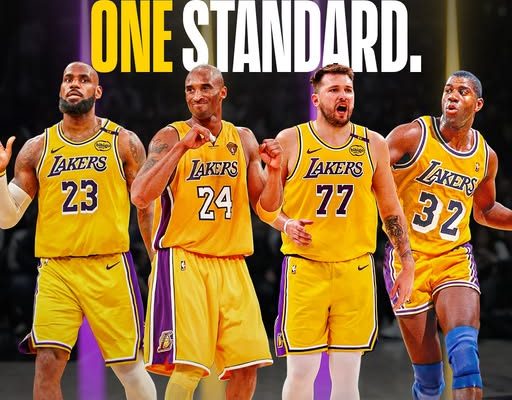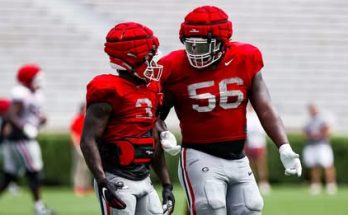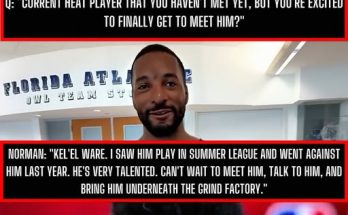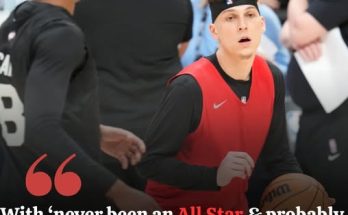Some franchises hope, beg, and pray for the kind of luck the Los Angeles Lakers have made look routine. Most NBA teams dream of discovering just one player who can change the trajectory of their franchise. The Lakers, meanwhile, have built an empire on generational greatness, passing the torch from one iconic superstar to the next. They haven’t merely stumbled into greatness — they’ve curated it, nurtured it, and turned it into an enduring brand that transcends basketball. From the electric flair of Magic Johnson’s Showtime era to the icy resolve of Kobe Bryant’s Mamba Mentality, from LeBron James restoring championship pride to Luka Dončić now poised as the next great steward of Purple and Gold — the Lakers haven’t just had legends. They’ve built a dynasty out of them.
It all begins in the 1980s, when Earvin “Magic” Johnson transformed a struggling NBA into must-see TV. His charisma, vision, and unselfish style ushered in a new era of basketball. Partnered with Kareem Abdul-Jabbar and later James Worthy, Magic didn’t just win — he defined how the Lakers played and how they were perceived. With five championships in the 1980s and a dazzling brand of basketball dubbed “Showtime,” Magic helped lay the foundation for what would become a franchise identity: excellence, flair, and above all, winning. He wasn’t just a superstar; he was the embodiment of L.A. glamour and basketball dominance rolled into one.
After Magic’s sudden and heartbreaking departure from the game in 1991 due to his HIV diagnosis, the Lakers found themselves searching for the next face of the franchise. The transition would take a few years, but in 1996, they struck gold — twice. First, they acquired a raw but electrifying high school guard named Kobe Bryant via draft-day trade with the Charlotte Hornets. Then, they signed the most dominant big man in basketball, Shaquille O’Neal. What followed was nothing short of historic. With Kobe and Shaq forming the deadliest one-two punch of the early 2000s, the Lakers won three straight championships from 2000 to 2002.
Though their partnership was explosive both on and off the court, and ultimately unsustainable, it set the stage for Kobe to mature into the kind of transcendent, team-defining star the Lakers had become accustomed to. When Shaq was traded to Miami in 2004, it was Kobe’s time to take the mantle and lead the team through a new era — one built around grit, resilience, and obsession with excellence. Kobe’s legendary 81-point game, his two post-Shaq titles in 2009 and 2010, and his unrelenting competitive fire earned him a permanent place in Lakers lore and basketball history. He didn’t just carry the franchise on his back — he redefined what it meant to be a Laker, setting the gold standard for future stars.
After Kobe’s retirement in 2016, the franchise again faced uncertainty. For the first time in decades, there was no obvious heir to the throne. Several young prospects passed through, and while some showed promise, none had the gravity to change the fate of the franchise — until LeBron James arrived in 2018. Already one of the most accomplished players in NBA history, LeBron’s decision to come to Los Angeles wasn’t just about basketball — it was about legacy, family, and business. Critics questioned whether he was more focused on Hollywood than hardwood. But just two seasons into his Laker tenure, LeBron delivered what he came to deliver: a championship in 2020, in the bubble, during one of the most emotionally and physically grueling seasons in league history.
That title — the franchise’s 17th — tied the Lakers with their eternal rivals, the Boston Celtics, and cemented LeBron’s place among the pantheon of Laker greats. He became the only player to win NBA titles with three different franchises as the undisputed leader, and he did it wearing the same jersey as Magic, Kareem, and Kobe. For many, that was the crowning moment of LeBron’s career. But for the Lakers, it was just another reminder of their uncanny ability to land the right player at the right time — and ask them to rise to the moment.
Now, the torch appears to be passed once again. Luka Dončić, the Slovenian prodigy who has wowed the league since his teenage years, is officially donning the Purple and Gold. While it once seemed impossible that Dallas would part ways with the face of their franchise, a series of circumstances led to his relocation to Los Angeles — a city and franchise built for superstardom. Luka is not just a top-tier talent; he’s a basketball savant, a creative genius on the court who combines scoring, passing, rebounding, and leadership in ways that mirror Magic’s showmanship and LeBron’s cerebral control of the game.
In Luka, the Lakers see the future — not just of their team, but perhaps the league itself. He’s young, hungry, and entering his prime. Unlike some young stars who may shrink under the bright lights of L.A., Luka seems made for it. Already a perennial MVP candidate, his game and personality fit the mold of previous Lakers legends. There’s bravado, but also humility. Swagger, but also substance. And as he begins his journey in Los Angeles, the expectations aren’t just high — they’re historic.
But Luka doesn’t enter this chapter blindly. He knows the jersey he’s putting on is heavy. It’s stitched with decades of greatness, pressure, and sacrifice. There’s an understanding that being a Laker isn’t about stats or accolades — it’s about banners. Luka’s transition to the Lakers isn’t just a new stop in his career; it’s a redefinition of his identity as a player. No longer just a star for a rising Western Conference team, he is now the centerpiece of a franchise that measures success not in All-Star appearances but in rings.
The Lakers, for their part, have once again done what few franchises ever manage to do — remain relevant across generations by aligning themselves with generational talent. Whether it’s smart front office moves, market appeal, or just a touch of destiny, the Lakers have made a habit out of securing superstars who define eras. It’s not luck. It’s culture. It’s expectation. It’s the Laker way.
The transition from one era to the next hasn’t always been seamless. There were down years. There were missed free agents, failed draft picks, and internal strife. But unlike other franchises that fall into decades-long irrelevance, the Lakers always find a way back. And they don’t come back quietly. They come back swinging, backed by stars who embrace the weight of legacy and the responsibility of continuing it.
As Luka begins this next chapter in L.A., he joins a lineage unlike any other in sports. He steps into a spotlight that has both illuminated and blinded those who’ve stood under it. But with his unique blend of skill, IQ, and tenacity, he seems primed not just to survive under the pressure — but to thrive.
Magic brought joy. Kobe brought fire. LeBron brought leadership. Now Luka brings the promise of the future. And in Los Angeles, where basketball meets mythology, it’s not enough to be great — you have to become a legend.
With Dončić in the fold, the Lakers are once again positioned for a new golden age. And whether it results in one banner or five, his arrival marks a continuation of one of the most remarkable traditions in sports — a franchise that doesn’t just welcome generational talent, but builds its identity around it. In L.A., legends aren’t rare. They’re the standard. They’re the expectation. They’re the tradition. And Luka is next in line.



